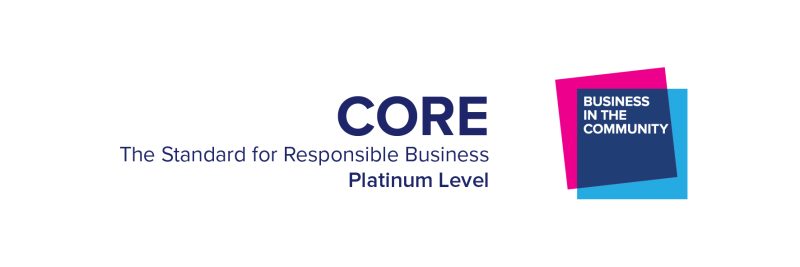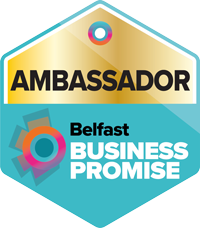How I Became A….
Job Title: Project Engineer
Company: Belfast Harbour
Give a brief outline of your career to date.
I have been working with Belfast Harbour’s Port Engineering department for 12 years. Before that I spent 4 years as an AutoCad Technician for an architectural practice in Belfast. That was my first proper job, although I’ve had part-time jobs working in a bar and on construction sites.
What was your favourite subject at school?
I was a bit of a mixed bag – I really enjoyed Science and Maths, but was equally fond of English and History. If I was being totally honest, though, I’d probably say PE was my favorite subject.
Did you go on to further/higher education, if so what did you study and where?
I went to Belfast Metropolitan College and studied for a Higher National Diploma in Manufacturing and Mechanical Engineering.
When I joined Belfast Harbour they provided me with the support and encouragement to study part-time for a Higher National Certificate in Civil Engineering, also at Belfast Met.
I then took the opportunity to further my career and completed a Civil Engineering and Construction Management degree at Ulster University in 2014. The experience of working at the Harbour alongside some of the most experienced engineers in Northern Ireland was a massive advantage that really helped bring the academic course to life.
How did you get into your area of work?
I always had an interest in Engineering, particularly the built environment. From a young age I was fascinated at how buildings and spaces interacted, and I was curious about what made some locations more enticing than others.
That led to an interest in technical drawing which in turn gave me the experience to secure my position with Belfast Harbour.
Is this what you always wanted to do?
Yes and no. I was always interested in construction, but my original plan was to join the Fire Service. In the end, though, my interest in the built environment won out. I liked the idea of playing a part in shaping the physical world around us.
Were there any particular essential qualifications or experience needed?
For my first position with Belfast Harbour I had to be proficient in AutoCAD, and have relevant GSCEs and experience. After that the Harbour was great at mapping out a route for further career development, helping me secure the necessary qualifications at college and then university level.
Are there alternative routes into the job?
If you ask people how do you become a Civil Engineer nine times out of ten they’ll say A levels and university. While most of my peers come from the Contractor and Designer side of Civil Engineering – straight from university – that’s not the only way into the industry.
There are opportunities through further education and apprenticeships which can be just as good a gateway into the industry if you can demonstrate enthusiasm and some relevant experience.
What are the main personal skills your job requires?
Engineering is a dynamic career and the skillset is suitably diverse. It’s vital to be good at problem solving, to be a strong communicator and have the ability to work under pressure towards deadlines. It goes without saying that you need to be accurate, have an eye for detail in all things and a sound grasp of technical issues.
You also need to have the confidence to take decisions which could have major ramifications for the success of a project, to think of the wider commercial challenges for the business and to work comfortably in a team.
What does a typical day entail?
It changes day-to-day. Belfast Harbour isn’t a typical employer so it’s no surprise that we don’t tend to do typical days! We are responsible for an immense estate covering 3,000 acres of land and sea. It handles 70% of all Northern Ireland’s seaborne trade and is home to major urban regeneration projects including City Quays, Titanic Quarter, Catalyst Inc and Holywood Exchange. As a business it’s fundamental to keeping day-to-day life going throughout Northern Ireland.
Daily activities vary depending on operational requirements, but usually it will include liaising with the Harbour’s Operations Department, monitoring site progress, dealing with contractors, issuing permits to work, reviewing health and safety documentation and drafting tenders.
What are the best and most challenging aspects of the job?
Much of my work touches upon the operational side of the port. With almost 24m tonnes of cargo coming through every year and around 6,000 ship movements, things can get busy! I need to stay on top of things and juggle competing demands to ensure things run as programmed. When I was studying and working at the same time I had to be very organized and manage competing priorities, not to mention the commitments I had with a young family!
Why is what you do important?
If Belfast Harbour doesn’t run smoothly everyone in Northern Ireland could potentially be affected. The Port is our primary gateway to the world for both importers and exporters, and handles much of the goods that we all depend on, be that fuel or food imports.
We are a 24/7 business – that means constantly maintaining and upgrading the existing infrastructure which keeps a busy commercial port running. In the past decade Belfast Harbour has invested £250m and is committed to future projects totaling more than £130m.
What advice would you give anyone looking to follow a similar career path?
Don’t be afraid to step out of your comfort zone, be open to career opportunities and work hard.
Also, if just starting out, do some research on your prospective employer. If you can, look out for those who have a reputation for nurturing their staff.
If you weren’t doing this what would you like to do?
I sometimes think what might have been had I pursued a career with the Fire Service, but I really wouldn’t do anything else – I genuinely enjoy the daily challenges of my job.
What is the one piece of advice you would give to yourself on your first day?
Don’t be afraid to ask others for assistance – the team only works when it works together.
Describe your ideal day off.
Spending time with my family – my three daughters keep me on my toes! I also enjoy fell running in the Mournes and am involved with Castlewellan GAC.
And finally, what’s the key to any successful job search?
Get on track with the right qualifications and have the right attitude – these will open doors for you.


